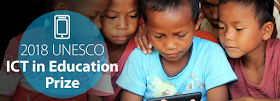SchoolNet SA is proud to announce that the 'Learning Gains Through Play' project, funded by the DG Murray Trust, has been nominated by the South African National Commission to be considered for the UNESCO ICT in Education Prize.
Each of the project schools were given tablets for teachers and learners as well as an Xbox Kinect (with games) and a large TV. Knowing that technology alone is unlikely to lead to significant changes to teaching and learning, the main focus of the project was on intensive teacher professional development in games-based learning and the value of digital learning when taught effectively. A range of educational apps and games were evaluated and analysed in terms of the national curriculum and teachers shared ideas and strategies for using digital tools in their classrooms. Workshops on Peer Coaching and Change Leadership were also provided to ensure buy-in from principals and school leaders, and also to ensure that teachers would be able to provide sustainable support to one another once the project is complete.
What is the UNESCO ICT in Education prize?
The UNESCO King Hamad Bin Isa Al-Khalifa ICT in Education Prize was established in 2005 and is funded by the Kingdom of Bahrain. The prize aligns with the Education 2030 agenda and Sustainable Development Goal 4 and recognizes innovative approaches in leveraging new technologies to expand educational opportunities. The awards recognize teachers and organisations who are executing excellent models, best practices and creative uses of ICTs to enhance overall education performance. From the various national nominations, an international jury selects the two best projects to be acknowledged during a ceremony at UNESCO Headquarters in Paris.What was the aim of the Learning Gains Through Play project?
The vision of the 'Learning Gains through Play' programme was to transform learning environments by placing digital resources in the hands of learners, making the learning personalized, learner-driven, and resulting in students becoming skilled, excited and motivated life-long learners.How was the project executed?
Twelve under-resourced schools (and two control schools) were selected from the areas around Howick in KwaZulu-Natal and Somerset West in the Western Cape to be part of this pilot project. Whilst the number of schools was small, the intention of the project was to provide intensive professional development and support to teachers, an array of resources to Foundation Phase classrooms, and to monitor the progress made by the learners. It was hoped that as a result of this research project that conclusive findings could be made as to the value of play in promoting learning gains, which will hopefully lead to other, similar projects being rolled out.Each of the project schools were given tablets for teachers and learners as well as an Xbox Kinect (with games) and a large TV. Knowing that technology alone is unlikely to lead to significant changes to teaching and learning, the main focus of the project was on intensive teacher professional development in games-based learning and the value of digital learning when taught effectively. A range of educational apps and games were evaluated and analysed in terms of the national curriculum and teachers shared ideas and strategies for using digital tools in their classrooms. Workshops on Peer Coaching and Change Leadership were also provided to ensure buy-in from principals and school leaders, and also to ensure that teachers would be able to provide sustainable support to one another once the project is complete.
In what way are the beneficiaries vulnerable?
If there is a lack of meaningful learning in the Foundation Phase, learners fail to master foundational literacies such as visual literacy skills, fine-motor skills, literacy and numeracy. Without a good foundation, the conceptual gaps widen with each successive year, preventing progress later in primary school and beyond. If learners fail to grasp the basics of reading and numeracy in the Foundation Phase, when they are still taught in their mother-tongue, the deficits are only likely to worsen when the learners move to grade four and the medium of instruction changes to English.How has the use of digital tools enhanced the education of the participants?
The Learning Gains programme explored how visual literacy, fine-motor skills, literacy and numeracy can be enhanced through play and importantly, through the innovative use of tablet apps and games and the Xbox Kinect. Teacher development was designed to guide teachers on how to mediate learning in relation to the curriculum while learners were using the technology and resulted in confident use by both teachers and learners.What have been some of the findings of the project?
We have tracked the performance of learners at the project schools who have been part of this project since grade one, testing them regularly in terms of literacy, numeracy, fine-motor skills and English acquisition. On the whole, we have been incredibly pleased with their progress, which has been better than that of learners in the control schools. Here are some of our key findings:
- The 2017 study indicated that exposure to digital games had significantly improved a range of literacies of learners in project schools and most notably that of oral English acquisition
- The 2018 study of project learners in Grade 4 indicated that as the learners' acquired language stages improved, there was a positive overall improvement in all subjects
- Exposure to digital tools and resources that use the medium of English in Foundation Phase, impacts significantly on Oral English Acquisition and thus overall academic performance by Grade 4
- Wherever there is a low level of second language English, digital tools and particularly digital games can be used to fast track progress.








No comments:
Post a Comment